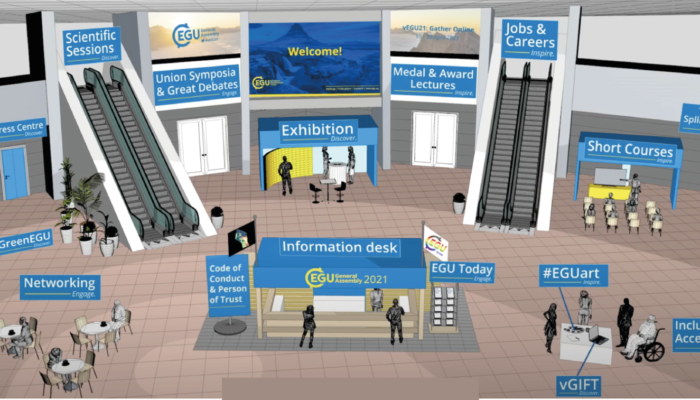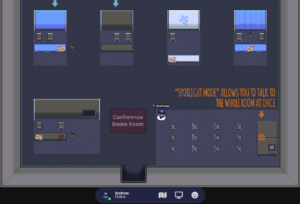
This year’s EGU General Assembly (GA) will be held completely online, as #vEGU21: Gather Online. The virtual GA will have all the activities of an in-presence conference with scientific sessions, networking opportunities and short courses. Connecting with your peers and making new contacts can be challenging in an online setting, but there are a number of great events planned on different platforms, like Zoom, Gather and BigBlueButton. The GA provides ample chances of informal exchange, especially for early career scientists (ECS).
With only a few days left before the start of vEGU21, we want to give you a brief overview of Geodesy division related events during the upcoming two weeks as a starting point for your personal programme. This list is far from exhaustive, so watch out and spread the word on any interesting sessions you might find.
Geodesy Division Early Career Scientists (ECSs) Networking Event
- When: Monday, April 19th, 12:30 – 1:30 pm (CEST)
- What to expect: We will give you a short introduction about the structure of the EGU, how to create your personal programme, how to adjust your profile page, who are the outgoing and incoming Geodesy Division Reps and who else is on the Geodesy Division Team, and most important, we would like to use this time to chat with you and hear from you what your expectations are (for the vEGU21 and/or the ECS Reps).
- How: Zoom (Link will be made available via the session description)
Geodesy Division Business Meeting
- When: Thursday, April 22nd, 1:30 – 2:30 pm (CEST)
- What to expect: The Geodesy Division Team will present the newest information about the Geodesy Division: What has happened since the last EGU GA? How many abstracts have been received within Geodesy? Who is part of the Geodesy Division Board? What is happening in the coming year?
Geodesy Reception
- When: Thursday, April 22nd, starts at 7 pm (CEST)
- What to expect: This year’s Geodesy reception will be held online on the platform gather.town. In Gather you can virtually walk through the venue with your avatar, start and join conversions just as in real life. It is easy to pick up, but for those eager to explore more features: check out the documentation (https://support.gather.town/help/getting-started). Gather can be used on any computer (laptop or desktop), on any OS (Windows, Mac OS, Linux), using one of the supported web browsers (Google Chrome, Firefox, and Safari).
- How: Gathertown (Link will be made available via the session description)
How to navigate the EGU: tips and tricks
- When: Monday, April 19th, 9 – 10 am (CEST)
- What to expect: During this course, you will get to know tips and tricks on how to handle this large conference and how to make the most out of your week at this year’s General Assembly. The EGU structure and the difference between EGU and the General Assembly will be explained and you get to know the program groups and some key persons that help the Union function.
ECS Forum
- When: Wednesday April 28th, 12:30 – 1:30 pm (CEST)
- What to expect: Here you can share your thoughts/suggestions/remarks/wishes on both vEGU21 and on EGU as an organization via a survey/poll. We are looking forward to hearing from you and getting your input.
ECS Union-wide Networking Event
- When: Tuesday April 27th, 7 – 8 pm (CEST)
- What to expect: The ECS Union-wide Networking Event is the opportunity to get to know your peers across all disciplines. As we all know, your network goes beyond your peers and therefore senior scientists, medallists and awardees, EGU volunteers, committee members and ECS Representatives will also be around. Make sure you catch them for career advice, interesting stories, or just a low-key chat.
- How: Gathertown
Last but not least – The medal lectures within the Geodesy division
- Vening Meinesz Medal Lectures:
- Willli Freeden (2020 medal lecture, “Decorrelative Mollifier Gravimetry”) – Thursday, April 22nd, 3 – 4 pm (CEST)
- Chris Jekeli (2021 medal lecture, “The Deflection of the Vertical, from Bouguer to Vening-Meinesz, and Beyond – the unsung hero of geodesy and geophysics”) – Thursday, April 22nd, 4 – 5 pm (CEST)
- Outstanding ECS Award Lectures:
- Karina Wilgan (2020 medal lecture, “Tropospheric products as a signal of interest – overview of troposphere sensing techniques”) – Thursday, April 29th, 2:15 – 2:45 pm (CEST)
- Anna Kłos (2021 medal lecture, “Benchmarking GPS stations: an improved way to identify the GPS sensitivity”) – Wednesday, April 28th, 2:20 – 2:30 pm (CEST)
Screenshot of Gathertown
There are even more ECS events. All divisions will host an ECS event and you can attend them as well (more here). Also join one of the many short courses: e.g., on mental well-being, on the needs of scientific posters, tips and hints for proposal writing, outreach, …. They will be recorded and you can watch them any time afterwards during the meeting
Now that we have pointed out a lot of networking and skillset-building highlights, don’t forget to check the programme for all the scientific sessions as they will take place in the second week.
You are welcome to join the discussion by using the hashtag #vEGU21_G and tag @EGU_Geodesy in your tweet.
We are looking forward to seeing you!
The Geodesy ECS Representative Team
Katrin Bentel, Rebekka Steffen, Mathis Bloßfeld, Andreas Kvas
Useful links:
Everything you need to know about the scientific sessions
Everything you need to know about the vEGU21 schedule
Everything you need to know about displays, commenting and licencing
First time session conveners advice from ECS
Top 10 tips for promoting good online engagement for conveners
The EGU code of conduct
Your profile and the conference networker
Jobs and careers at vEGU21
Pop up networking events

